Module 3 Heroes Unit 2There were few doctors, so he had to work very hard on his own.课件39张PPT
文档属性
| 名称 | Module 3 Heroes Unit 2There were few doctors, so he had to work very hard on his own.课件39张PPT | 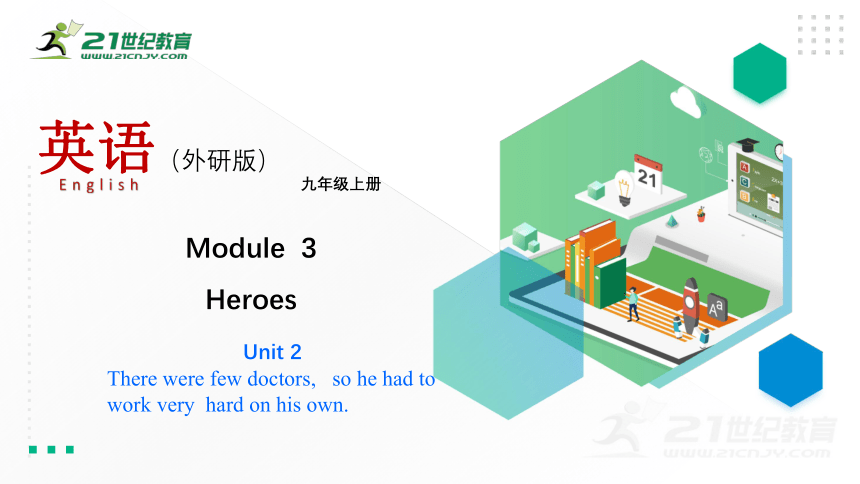 | |
| 格式 | pptx | ||
| 文件大小 | 8.8MB | ||
| 资源类型 | 试卷 | ||
| 版本资源 | 外研版 | ||
| 科目 | 英语 | ||
| 更新时间 | 2021-08-16 19:41:07 | ||
图片预览

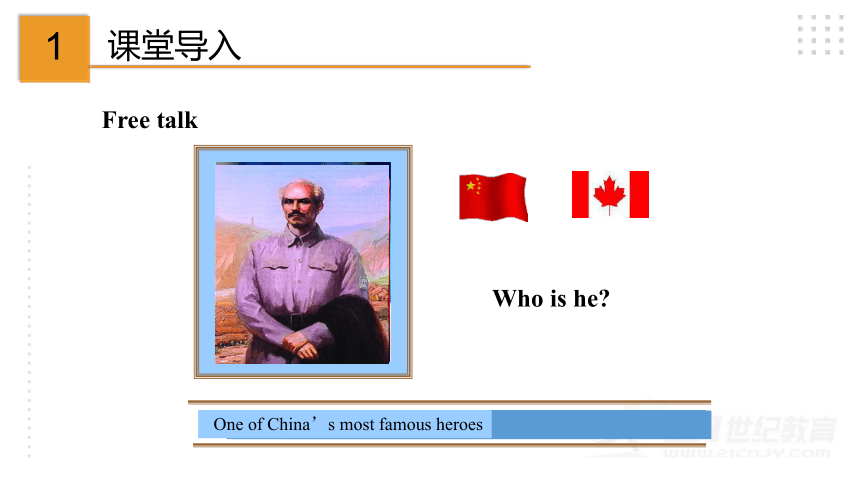
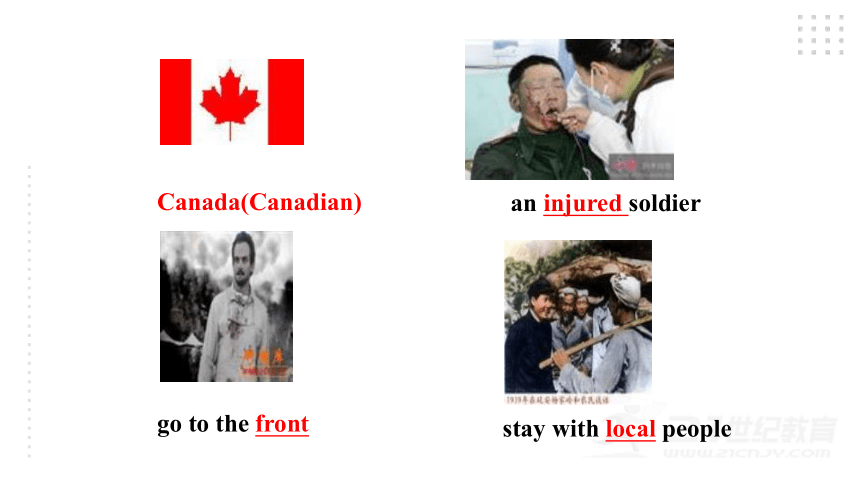
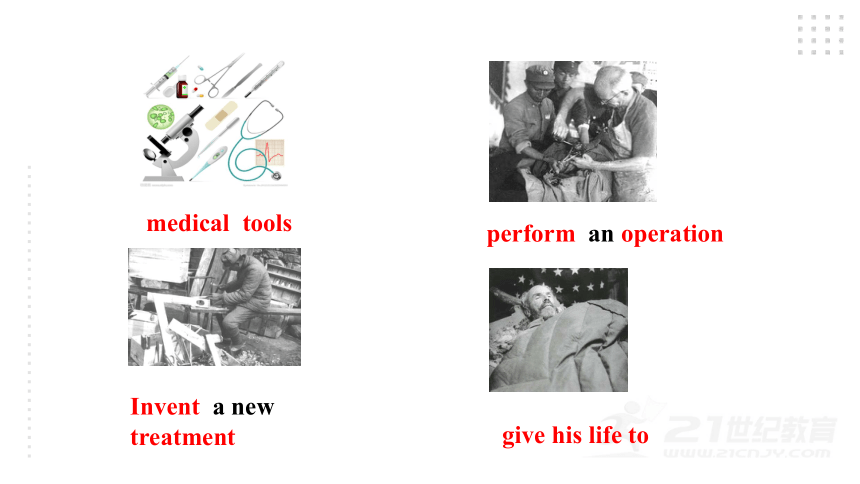

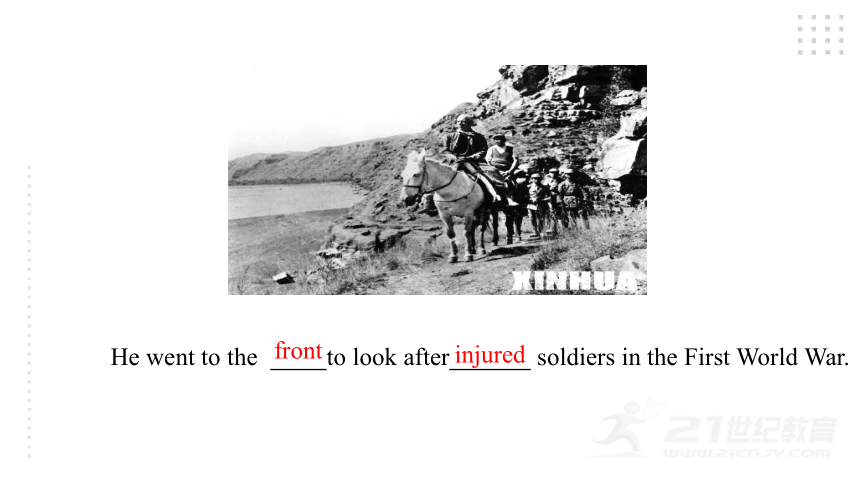
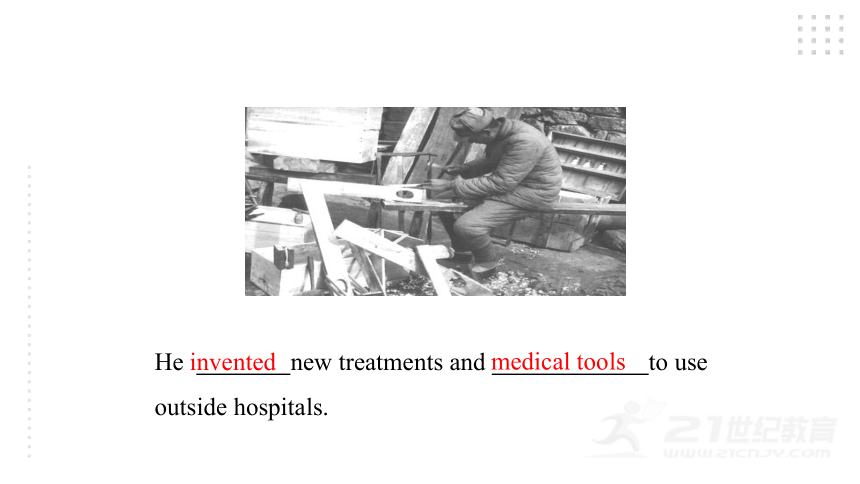
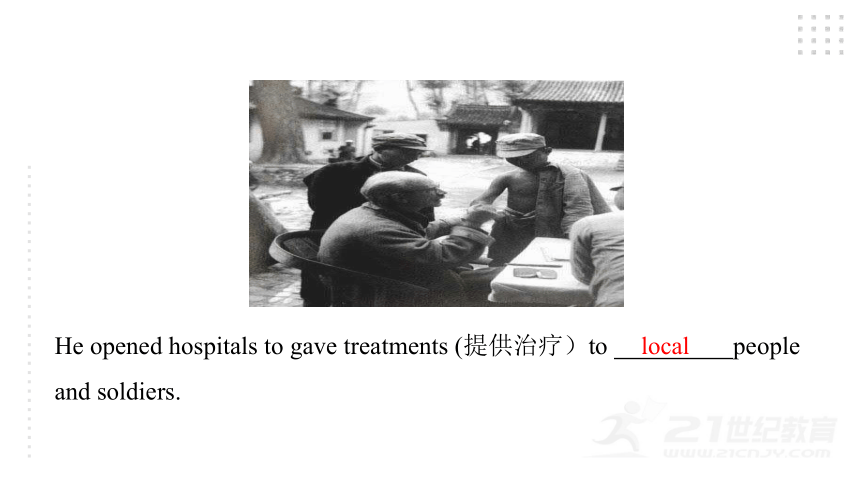
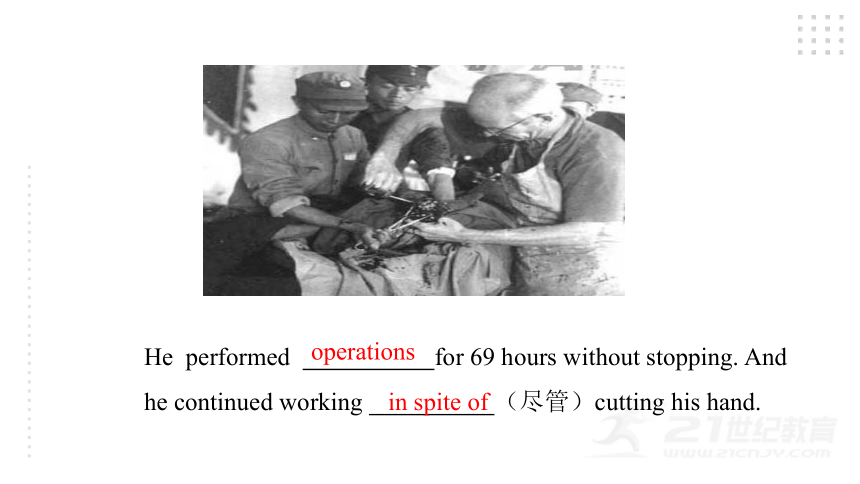
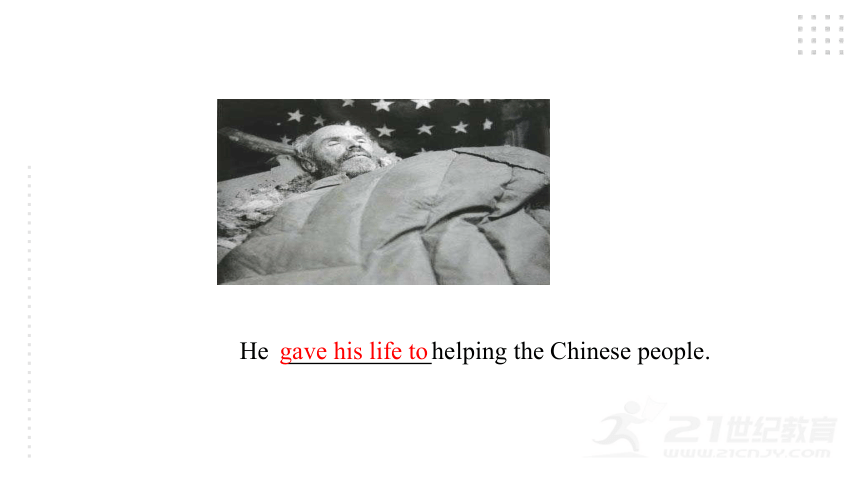
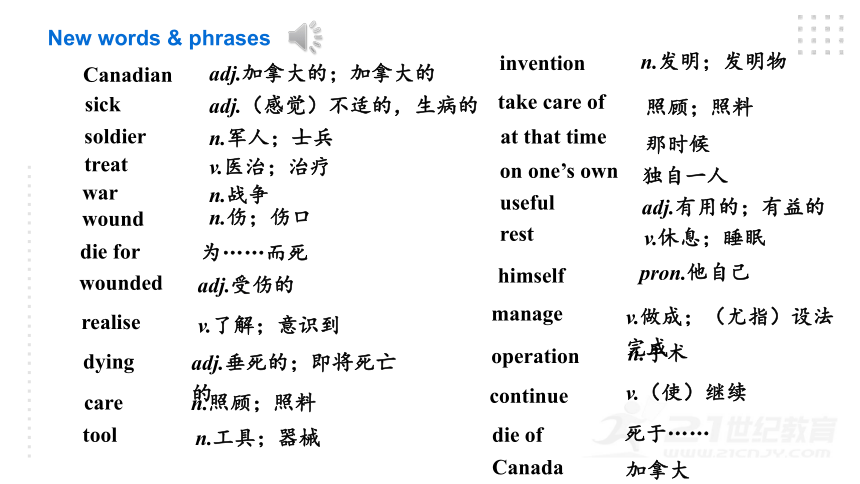
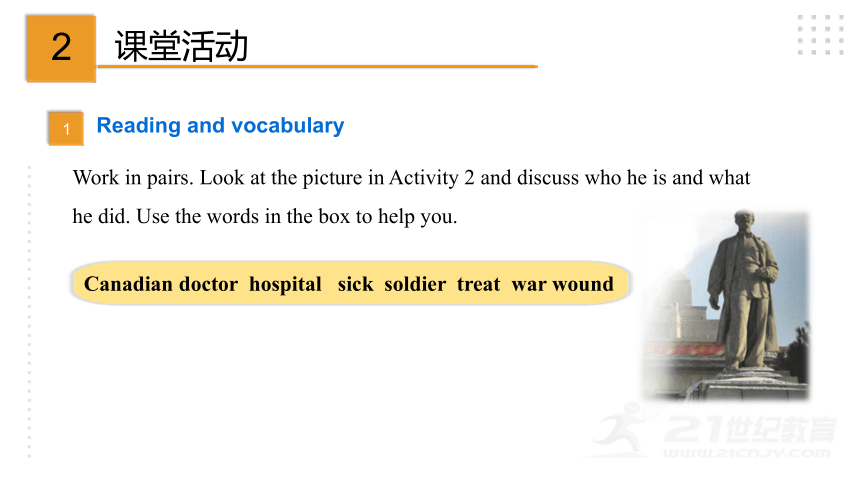
文档简介
英语(外研版)
九年级上册
English
Module 3
Heroes
Unit 2
There were few doctors, so he had to work very hard on his own.
China’s first astronaut
Who is he?
The engineer of a famous railroad
Father of “hybrid rice”
A famous film star
A famous sports star
One of China’s most famous heroes
Free talk
1
课堂导入
Canada(Canadian)
an injured soldier
go to the front
stay with local people
medical tools
perform an operation
Invent a new treatment
give his life to
He is one of the most famous heroes in China.
He is a doctor from Canada.
He saved many wounded soldiers in the Anti-Japanese War.
In the end, he died for Chinese people in China.
为……而死
受伤的士兵
Who is he?
He went to the to look after soldiers in the First World War.
front
injured
He new treatments and to use outside hospitals.
invented
medical tools
He opened hospitals to gave treatments (提供治疗)to people and soldiers.
local
He performed for 69 hours without stopping. And he continued working (尽管)cutting his hand.
operations
in spite of
He helping the Chinese people.
gave his life to
New words & phrases
Canadian
sick
soldier
treat
war
wound
adj.加拿大的;加拿大的
die for
wounded
adj.(感觉)不适的,生病的
n.军人;士兵
v.医治;治疗
n.战争
n.伤;伤口
为……而死
adj.受伤的
realise
dying
care
take care of
tool
invention
v.了解;意识到
at that time
on one’s own
adj.垂死的;即将死亡的
n.照顾;照料
照顾;照料
n.工具;器械
n.发明;发明物
那时候
独自一人
useful
rest
himself
manage
operation
continue
adj.有用的;有益的
die of
Canada
v.休息;睡眠
pron.他自己
v.做成;(尤指)设法完成
n.手术
v.(使)继续
死于……
加拿大
Reading and vocabulary
Work in pairs. Look at the picture in Activity 2 and discuss who he is and what he did. Use the words in the box to help you.
Canadian doctor hospital sick soldier treat war wound
2
课堂活动
1
His name was Norman Bethune.
Norman Bethune is a Canadian.
He saved many lives in China.
He treated wounded soldier in the war in China.
My hero - Dr Norman Bethune
By Wang Lingling
Norman Bethune is one of the most famous heroes in China. He was a Canadian doctor. He came to China to help the Chinese people and died for them.
Norman Bethune was born in 1890. He became a doctor in 1916 and went to Spain in 1936 to treat the wounded soldiers during the war there. He soon realised that many people were dying because they did not get to hospital quickly enough. Dr Bethune developed new ways of taking care of the sick. He invented special medical tools to use outside hospitals and close to the fighting areas so that doctors could treat the wounded more quickly. His inventions saved many lives.
Read the passage and check your answers to Activity 1.
2
In 1938, Dr Bethune came to China and helped treat the wounded during the Anti-Japanese War. At that time, there were few doctors, so he had to work very hard on his own. His experience of treating people in Spain was useful in China. He developed training courses for local doctors and nurses, and wrote books so that they could learn about how he treated the sick.
Dr Bethune often worked very hard without resting or taking care of himself. Once, he even worked for sixty-nine hours without stopping and managed to save over a hundred lives. One day in 1939, he cut his finger during an operation, but he continued his work without treating it. In the end, he died of his wound.
Dr Bethune’s work for the Chinese people made him a hero in China. There are many books and films about him, and he is still remembered in both China and Canada today.
Read the article and match the main idea of with each paragraph.
Para 1
Para 2
Para 3
Para 4
Para 5
a. His work for the Chinese soldiers
made him a hero.
b. He worked hard without stopping to
rest until he died.
c. He was a Canadian, but a famous hero in China.
d. He helped soldiers in the First World War.
e. He came to China to treat the Chinese soldiers.
Read the article carefully and answer the questions.
1. What did he give his life to?
2. Why did he invent new ways to treat soldiers?
3. What did Norman Bethune do during his stay in China?
He gave his life to helping the Chinese people.
Because he saw many soldiers die in the war.
He helped treat the wounded, developed training courses for local doctors and nurses and wrote books.
4. Why did Bethune die in the end?
5. What was wrong with his hand?
6. What made Dr Bethune a hero?
Because he did not stop to treat his hand.
He cut his finger during an operation.
Dr Bethune's work for the Chinese people made him a hero in China.
Language points
Dr Bethune developed new ways of taking care of the sick.
1. 白求恩医生研究出了新方法照料病人。
例:盲人在特殊学校学习手艺。
The blind learn skills in special school.
the sick 结构是定冠词后面加上形容词,表示复数的概念,泛指某一类人。这类结构作助语时谓语动词要用复数形式。
continue 作动词,“继续”。
常用短语:continue to do/doing sth.
3. continue
例:她有孩子后,继续工作。
相当于go on doing sth
继续从事某事
After she had a baby, she continued to work/working.
= After she had a baby, she went on working.
意为“独自的;独立的;主动的”。
2. on one’s own
I am able to finish the work on my own.
例:雨一直下到昨天深夜。
The rain continued till last night.
(2) continue + 副词/名词; 继续;持续。
我将再继续学习一年。
I’ll continue my study for another year.
例:你最好大声说话,以便我们能听到。
You’d better speak aloud so that we can hear you.
4. so that与so···that
so that 主要引导目的状语从句,“目的是······”。 从句中的谓语动词常和can,may, should等连用
(2) so···that中,so 后面跟一个形容词或副词,意为“如此······以致······”,引导表结果的状语从句。
例:他跑得那么快,以致于我赶不上他。
He ran so fast that I couldn’t catch up with him.
5. wound,hurt,injure与cut的用法:
①wound指枪伤、刀伤、刺伤等皮肉之伤,是出血的、严重的伤,尤其指用武器有意造成的伤口、伤疤或战场上受伤,也可指人们精神上的创伤。如:
The thief wounded him with a knife. 那小偷用刀刺伤了他。
②hurt为普通用语,既可指肉体上的伤害,也可指精神上、感情上的伤害,多指伤痛。如:
I hurt my leg badly in the football match.
在那场足球赛中,我的腿受了重伤。
③injure比hurt正式,主要指意外事故中损害健康、容貌等,强调功能的损失。如:
A bullet injured his left eye. 一颗子弹伤了他的左眼。
④cut指无意中造成的轻伤(划伤、割伤、弄伤)。如:
Don’t?cut?your finger. 别切着手指。
6. ill?与sick的用法:ill?和sick都有“生病的;有病的”之意,但用法并不完全相同。??
①ill?意为“生病的;有病的”,一般用作表语,不能作定语。如:
The little child is ill. 这个小孩子生病了。// My mother feels ill. 我的妈妈感觉不舒服。
②sick?意为“生病的;(感觉)不适的”,既可作表语又可作定语,如:“病人”可以说a sick man,但不能说an ill man。如:
She is sick in bed. 她卧病在床。(作表语)// She is looking after her sick father. 她在照顾她生病的父亲。(作定语)
7. manage to do sth.,try to do sth.与try doing sth.的用法:
①manage to do sth.意为“设法做成某事”,强调结果,事情已经成功,相当于succeed?in?doing sth.。如:
He managed to send the passengers to the airport in time.
他设法把乘客及时送到了机场。
②try to do sth.意为“努力/设法/试图/尽力去做某事”,强调过程,能否成功不确定。如:
We tried to stop him smoking in bed but he would do it.
我们试图阻止他在床上吸烟,但他就是不听。
③try doing sth.意为“试着做某事”,表示抱着试试看的想法去做。如:
Let’s try knocking at the back door. Maybe he is sleeping.
咱们敲敲后门试试。可能他在睡觉。
8. die of与die?from?的用法:
①die of意为“死于……”,指死于疾病,衰老,感情,饥寒等内在原因。如:
His father died of cancer yesterday.
他的父亲昨天死于癌症。
The beggar died of hunger and cold.
这个乞丐死于饥饿和寒冷。
②die?from?意为“死于……”,指死于外伤、事故、劳累过度等外在原因。如:
The old man died from a traffic accident.
那位老人死于交通事故。
Hundreds of people are dying from polluted air in this area.
在这个地区, 数百人死于空气污染。
短语
为……而死
照顾,护理
那时候
独自一人
设法完成
死于……
died for
take care of
at that time
on one’s own
managed to do sth.
died of
He was born.
He became a doctor.
He went to Spain to treat
the wounded soldiers.
He came to China and
help treat the wounded.
He cut his finger during an operation,
and then he died of his wound.
1916
1936
1938
1939
a) came to China
b) wrote books about ways of treating the sick in China
c) was born in 1890
d) invented medical tools to use outside hospitals
e) died
f) treated the wounded soldiers in Spain
Number the events about Norman Bethune in the order they happened.
1
2
4
5
6
3
3
Complete the passage with the correct form of the words in the box.
Canadian continue himself invention manage sick tool war wound
Norman Bethune was (1)___________, but he is one of the most famous heroes in China. During the (2)______ in Spain, he treated the wounded soldiers there. He invented special (3)_____ to use outside hospitals.
Canadian
war
tools
4
His (4)___________saved many lives. In China, he (5)___________to treat (6)_____ and wounded soldiers. He often worked without taking a rest and did not look after (7)________. At one point, he (8)_________to save over one hundred lives in sixty-nine hours. During an operation, he cut his finger, and finally died of his (9)________. He is still remembered in both China and Canada.
inventions
continued
sick
himself
managed
wound
in 1890
be born
in 1916
become a doctor
in 1936
go to Spain, treat the wounded soldiers
later
develop new ways of..., invent special medical tools to...so that...,
in 1938
come to China,
develop training courses for...
write books so that…
once
work for 69 hours without...
manage to save over 100 lives
in 1939
cut his finger...continue... die of...
after he died
hard work…a hero…… be remembered…
Retell the passage in time order.
We can learn from Norman Bethune:
He continued working without stopping to rest for 69 hours.
work hard
He invented new treatments and medical tools.
creative
He helped treat Chinese soldiers during the war.
enjoy helping others / be friendly
love peace and hate wars
be hard-working
He went to the fighting area.
be brave
Let's Discuss!
Free Talk
Do you know who he is?
Writing
Look at the facts about Yuan Longping and write a passage about him. Use the passage in Activity 2 to help you.
Fact box: Yuan Longping
Is helping many countries of the world grow more rice than before.
Won World Food Prize
Now
2004
5
1980s
1974
1964
1950-1953
1930
Travelled around the world and gave advice about growing rice
Made a special study of rice
Studied in Southwest Agricultural College
Developed a new kind of rice
Was born in Beijing
●Write when and where he was born.
●Write about his studies.
●Write about the result of his work.
●Write about the things he did and the prize he won.
●Write about what he is doing now.
He was born in Beijing in 1930.
He studied in Southwest Agricultural College from 1950 to 1953.
He developed a new kind of rice — hybrid rice.
He travelled around the world and gave advice about growing rice in the 1980s. And he won World Food Prize in 2004.
He is helping many countries of the world grow more rice than before now.
“世界杂交水稻之父”?
the Father of Hybrid Rice
Yuan Longping was born in 1930 in Beijing. When he was 20 years old, he studied in Southwest Agricultural College. He finished his studies after three years and became a teacher.
In 1964, Yuan Longping made a special study of rice after natural disasters caused great damage to China’s rice harvest. He wanted to find a new, stronger kind of rice. He developed his new kind of rice in 1974.
In the 1980s, he travelled around the world and gave advice about growing rice to many people. In 2004, he won the World Food Prize for his work.
Yuan Longping’s new rice has helped many countries of the world grow more rice than before. So he is called “The Father of Rice”. He has saved many people from hunger, and that is why he is a hero.
The Sample
一、单项选择。
1. —What do you think is the greatest ______?
—The Internet. It is quite important in our daily life.
A. information B. invention
C. interest D. interview
2. —The cat is so weak that it is ______ now.
—What a pity!
A. lovely B. dying C. useful D. hard
3. After she cleaned the room, she continued ______ her clothes.
A. to washing B. washing C. with wash D. to wash
4. Several people ______ the accident yesterday.
A. died of B. died from C. died for D. died out
5. Dr Bethune worked hard ______ he could save more people’s lives.
A. so B. that C. so that D. such that
2. 汤姆,不要独自在河里游泳。
Don’t swim in the river ____________, Tom.
二、根据汉语意思,完成下列句子。
1. 当时我很生气,但是过后我冷静下来了。
____________ I was very angry, but later I calmed down.
At that time
on your own
3. 王先生的女儿上个月死于高烧。
Mr Wang’ s daughter ________ a high fever last month.
died of
4. 最后,他挽救了那个即将死亡的男孩的生命。
__________, he saved the dying boy’s life.
In the end
5. 当你外出时,他可以照顾好这些孩子们。
He can ________________ these kids when you are away.
take good care of
3
课堂小结
1. We have learnt how people in America celebrate the Thanksgiving Day.
2. We learnt some new words and expressions.
3. We have had a further understanding of Adverbial Clause of Time.
https://www.21cnjy.com/help/help_extract.php
九年级上册
English
Module 3
Heroes
Unit 2
There were few doctors, so he had to work very hard on his own.
China’s first astronaut
Who is he?
The engineer of a famous railroad
Father of “hybrid rice”
A famous film star
A famous sports star
One of China’s most famous heroes
Free talk
1
课堂导入
Canada(Canadian)
an injured soldier
go to the front
stay with local people
medical tools
perform an operation
Invent a new treatment
give his life to
He is one of the most famous heroes in China.
He is a doctor from Canada.
He saved many wounded soldiers in the Anti-Japanese War.
In the end, he died for Chinese people in China.
为……而死
受伤的士兵
Who is he?
He went to the to look after soldiers in the First World War.
front
injured
He new treatments and to use outside hospitals.
invented
medical tools
He opened hospitals to gave treatments (提供治疗)to people and soldiers.
local
He performed for 69 hours without stopping. And he continued working (尽管)cutting his hand.
operations
in spite of
He helping the Chinese people.
gave his life to
New words & phrases
Canadian
sick
soldier
treat
war
wound
adj.加拿大的;加拿大的
die for
wounded
adj.(感觉)不适的,生病的
n.军人;士兵
v.医治;治疗
n.战争
n.伤;伤口
为……而死
adj.受伤的
realise
dying
care
take care of
tool
invention
v.了解;意识到
at that time
on one’s own
adj.垂死的;即将死亡的
n.照顾;照料
照顾;照料
n.工具;器械
n.发明;发明物
那时候
独自一人
useful
rest
himself
manage
operation
continue
adj.有用的;有益的
die of
Canada
v.休息;睡眠
pron.他自己
v.做成;(尤指)设法完成
n.手术
v.(使)继续
死于……
加拿大
Reading and vocabulary
Work in pairs. Look at the picture in Activity 2 and discuss who he is and what he did. Use the words in the box to help you.
Canadian doctor hospital sick soldier treat war wound
2
课堂活动
1
His name was Norman Bethune.
Norman Bethune is a Canadian.
He saved many lives in China.
He treated wounded soldier in the war in China.
My hero - Dr Norman Bethune
By Wang Lingling
Norman Bethune is one of the most famous heroes in China. He was a Canadian doctor. He came to China to help the Chinese people and died for them.
Norman Bethune was born in 1890. He became a doctor in 1916 and went to Spain in 1936 to treat the wounded soldiers during the war there. He soon realised that many people were dying because they did not get to hospital quickly enough. Dr Bethune developed new ways of taking care of the sick. He invented special medical tools to use outside hospitals and close to the fighting areas so that doctors could treat the wounded more quickly. His inventions saved many lives.
Read the passage and check your answers to Activity 1.
2
In 1938, Dr Bethune came to China and helped treat the wounded during the Anti-Japanese War. At that time, there were few doctors, so he had to work very hard on his own. His experience of treating people in Spain was useful in China. He developed training courses for local doctors and nurses, and wrote books so that they could learn about how he treated the sick.
Dr Bethune often worked very hard without resting or taking care of himself. Once, he even worked for sixty-nine hours without stopping and managed to save over a hundred lives. One day in 1939, he cut his finger during an operation, but he continued his work without treating it. In the end, he died of his wound.
Dr Bethune’s work for the Chinese people made him a hero in China. There are many books and films about him, and he is still remembered in both China and Canada today.
Read the article and match the main idea of with each paragraph.
Para 1
Para 2
Para 3
Para 4
Para 5
a. His work for the Chinese soldiers
made him a hero.
b. He worked hard without stopping to
rest until he died.
c. He was a Canadian, but a famous hero in China.
d. He helped soldiers in the First World War.
e. He came to China to treat the Chinese soldiers.
Read the article carefully and answer the questions.
1. What did he give his life to?
2. Why did he invent new ways to treat soldiers?
3. What did Norman Bethune do during his stay in China?
He gave his life to helping the Chinese people.
Because he saw many soldiers die in the war.
He helped treat the wounded, developed training courses for local doctors and nurses and wrote books.
4. Why did Bethune die in the end?
5. What was wrong with his hand?
6. What made Dr Bethune a hero?
Because he did not stop to treat his hand.
He cut his finger during an operation.
Dr Bethune's work for the Chinese people made him a hero in China.
Language points
Dr Bethune developed new ways of taking care of the sick.
1. 白求恩医生研究出了新方法照料病人。
例:盲人在特殊学校学习手艺。
The blind learn skills in special school.
the sick 结构是定冠词后面加上形容词,表示复数的概念,泛指某一类人。这类结构作助语时谓语动词要用复数形式。
continue 作动词,“继续”。
常用短语:continue to do/doing sth.
3. continue
例:她有孩子后,继续工作。
相当于go on doing sth
继续从事某事
After she had a baby, she continued to work/working.
= After she had a baby, she went on working.
意为“独自的;独立的;主动的”。
2. on one’s own
I am able to finish the work on my own.
例:雨一直下到昨天深夜。
The rain continued till last night.
(2) continue + 副词/名词; 继续;持续。
我将再继续学习一年。
I’ll continue my study for another year.
例:你最好大声说话,以便我们能听到。
You’d better speak aloud so that we can hear you.
4. so that与so···that
so that 主要引导目的状语从句,“目的是······”。 从句中的谓语动词常和can,may, should等连用
(2) so···that中,so 后面跟一个形容词或副词,意为“如此······以致······”,引导表结果的状语从句。
例:他跑得那么快,以致于我赶不上他。
He ran so fast that I couldn’t catch up with him.
5. wound,hurt,injure与cut的用法:
①wound指枪伤、刀伤、刺伤等皮肉之伤,是出血的、严重的伤,尤其指用武器有意造成的伤口、伤疤或战场上受伤,也可指人们精神上的创伤。如:
The thief wounded him with a knife. 那小偷用刀刺伤了他。
②hurt为普通用语,既可指肉体上的伤害,也可指精神上、感情上的伤害,多指伤痛。如:
I hurt my leg badly in the football match.
在那场足球赛中,我的腿受了重伤。
③injure比hurt正式,主要指意外事故中损害健康、容貌等,强调功能的损失。如:
A bullet injured his left eye. 一颗子弹伤了他的左眼。
④cut指无意中造成的轻伤(划伤、割伤、弄伤)。如:
Don’t?cut?your finger. 别切着手指。
6. ill?与sick的用法:ill?和sick都有“生病的;有病的”之意,但用法并不完全相同。??
①ill?意为“生病的;有病的”,一般用作表语,不能作定语。如:
The little child is ill. 这个小孩子生病了。// My mother feels ill. 我的妈妈感觉不舒服。
②sick?意为“生病的;(感觉)不适的”,既可作表语又可作定语,如:“病人”可以说a sick man,但不能说an ill man。如:
She is sick in bed. 她卧病在床。(作表语)// She is looking after her sick father. 她在照顾她生病的父亲。(作定语)
7. manage to do sth.,try to do sth.与try doing sth.的用法:
①manage to do sth.意为“设法做成某事”,强调结果,事情已经成功,相当于succeed?in?doing sth.。如:
He managed to send the passengers to the airport in time.
他设法把乘客及时送到了机场。
②try to do sth.意为“努力/设法/试图/尽力去做某事”,强调过程,能否成功不确定。如:
We tried to stop him smoking in bed but he would do it.
我们试图阻止他在床上吸烟,但他就是不听。
③try doing sth.意为“试着做某事”,表示抱着试试看的想法去做。如:
Let’s try knocking at the back door. Maybe he is sleeping.
咱们敲敲后门试试。可能他在睡觉。
8. die of与die?from?的用法:
①die of意为“死于……”,指死于疾病,衰老,感情,饥寒等内在原因。如:
His father died of cancer yesterday.
他的父亲昨天死于癌症。
The beggar died of hunger and cold.
这个乞丐死于饥饿和寒冷。
②die?from?意为“死于……”,指死于外伤、事故、劳累过度等外在原因。如:
The old man died from a traffic accident.
那位老人死于交通事故。
Hundreds of people are dying from polluted air in this area.
在这个地区, 数百人死于空气污染。
短语
为……而死
照顾,护理
那时候
独自一人
设法完成
死于……
died for
take care of
at that time
on one’s own
managed to do sth.
died of
He was born.
He became a doctor.
He went to Spain to treat
the wounded soldiers.
He came to China and
help treat the wounded.
He cut his finger during an operation,
and then he died of his wound.
1916
1936
1938
1939
a) came to China
b) wrote books about ways of treating the sick in China
c) was born in 1890
d) invented medical tools to use outside hospitals
e) died
f) treated the wounded soldiers in Spain
Number the events about Norman Bethune in the order they happened.
1
2
4
5
6
3
3
Complete the passage with the correct form of the words in the box.
Canadian continue himself invention manage sick tool war wound
Norman Bethune was (1)___________, but he is one of the most famous heroes in China. During the (2)______ in Spain, he treated the wounded soldiers there. He invented special (3)_____ to use outside hospitals.
Canadian
war
tools
4
His (4)___________saved many lives. In China, he (5)___________to treat (6)_____ and wounded soldiers. He often worked without taking a rest and did not look after (7)________. At one point, he (8)_________to save over one hundred lives in sixty-nine hours. During an operation, he cut his finger, and finally died of his (9)________. He is still remembered in both China and Canada.
inventions
continued
sick
himself
managed
wound
in 1890
be born
in 1916
become a doctor
in 1936
go to Spain, treat the wounded soldiers
later
develop new ways of..., invent special medical tools to...so that...,
in 1938
come to China,
develop training courses for...
write books so that…
once
work for 69 hours without...
manage to save over 100 lives
in 1939
cut his finger...continue... die of...
after he died
hard work…a hero…… be remembered…
Retell the passage in time order.
We can learn from Norman Bethune:
He continued working without stopping to rest for 69 hours.
work hard
He invented new treatments and medical tools.
creative
He helped treat Chinese soldiers during the war.
enjoy helping others / be friendly
love peace and hate wars
be hard-working
He went to the fighting area.
be brave
Let's Discuss!
Free Talk
Do you know who he is?
Writing
Look at the facts about Yuan Longping and write a passage about him. Use the passage in Activity 2 to help you.
Fact box: Yuan Longping
Is helping many countries of the world grow more rice than before.
Won World Food Prize
Now
2004
5
1980s
1974
1964
1950-1953
1930
Travelled around the world and gave advice about growing rice
Made a special study of rice
Studied in Southwest Agricultural College
Developed a new kind of rice
Was born in Beijing
●Write when and where he was born.
●Write about his studies.
●Write about the result of his work.
●Write about the things he did and the prize he won.
●Write about what he is doing now.
He was born in Beijing in 1930.
He studied in Southwest Agricultural College from 1950 to 1953.
He developed a new kind of rice — hybrid rice.
He travelled around the world and gave advice about growing rice in the 1980s. And he won World Food Prize in 2004.
He is helping many countries of the world grow more rice than before now.
“世界杂交水稻之父”?
the Father of Hybrid Rice
Yuan Longping was born in 1930 in Beijing. When he was 20 years old, he studied in Southwest Agricultural College. He finished his studies after three years and became a teacher.
In 1964, Yuan Longping made a special study of rice after natural disasters caused great damage to China’s rice harvest. He wanted to find a new, stronger kind of rice. He developed his new kind of rice in 1974.
In the 1980s, he travelled around the world and gave advice about growing rice to many people. In 2004, he won the World Food Prize for his work.
Yuan Longping’s new rice has helped many countries of the world grow more rice than before. So he is called “The Father of Rice”. He has saved many people from hunger, and that is why he is a hero.
The Sample
一、单项选择。
1. —What do you think is the greatest ______?
—The Internet. It is quite important in our daily life.
A. information B. invention
C. interest D. interview
2. —The cat is so weak that it is ______ now.
—What a pity!
A. lovely B. dying C. useful D. hard
3. After she cleaned the room, she continued ______ her clothes.
A. to washing B. washing C. with wash D. to wash
4. Several people ______ the accident yesterday.
A. died of B. died from C. died for D. died out
5. Dr Bethune worked hard ______ he could save more people’s lives.
A. so B. that C. so that D. such that
2. 汤姆,不要独自在河里游泳。
Don’t swim in the river ____________, Tom.
二、根据汉语意思,完成下列句子。
1. 当时我很生气,但是过后我冷静下来了。
____________ I was very angry, but later I calmed down.
At that time
on your own
3. 王先生的女儿上个月死于高烧。
Mr Wang’ s daughter ________ a high fever last month.
died of
4. 最后,他挽救了那个即将死亡的男孩的生命。
__________, he saved the dying boy’s life.
In the end
5. 当你外出时,他可以照顾好这些孩子们。
He can ________________ these kids when you are away.
take good care of
3
课堂小结
1. We have learnt how people in America celebrate the Thanksgiving Day.
2. We learnt some new words and expressions.
3. We have had a further understanding of Adverbial Clause of Time.
https://www.21cnjy.com/help/help_extract.php
同课章节目录
- Module 1 Wonders of the world
- Unit 1 It's more than 2,000 years old.
- Unit 2 The Grand Canyon was not just big.
- Unit 3 Language in use
- Module 2 Public holidays
- Unit 1 My family always go somewhere interesting a
- Unit 2 We have celebrated the festival since the f
- Unit 3 Language in use
- Module 3 Heroes
- Unit 1 She trained hard,so she became a great play
- Unit 2There were few doctors, so he had to work ve
- Unit 3 Language in use
- Module 4 Home alone
- Unit 1 I can look after myself, although it won’t
- Unit 2 I became so bored with their orders that I
- Unit 3 Language in use
- Module 5 Museums
- Unit 1 Don't cross that rope!
- Unit 2 If you ever go to London, make sure you vis
- Unit 3 Language in use
- Module 6 Problems
- Unit 1 If I start after dinner, I'll finish it be
- Unit 2 If you tell him the truth now, you will sho
- Unit 3 Language in use
- Revision Module A
- Module 7 Great books
- Unit 1 We're still influenced by Confucius's idea
- Unit 2 It is still read and loved.
- Unit 3 Language in use
- Module 8 Sports life
- Unit 1 Daming wasn't chosen for the team last time
- Unit 2 He was invited to competitions around the w
- Unit 3 Language in use
- Module 9 Great inventions
- Unit 1 Will computers be used more than books in t
- Unit 2 Will books be replaced by the Internet?
- Unit 3 Language in use
- Module 10 Australia
- Unit 1 I have some photos that I took in Australia
- Unit 2 The game that they like most is Australian
- Unit 3 Language in use
- Module 11 Photos
- Unit 1 He's the boy who won the photo competition
- Unit 2 The photo which we liked best was taken by
- Unit 3 Language in use
- Module 12 Save our world
- Unit 1 If everyone starts to do something, the wor
- Unit 2 Repeat these three words daily: reduce, reu
- Unit 3 Language in use
- Revision Module B
